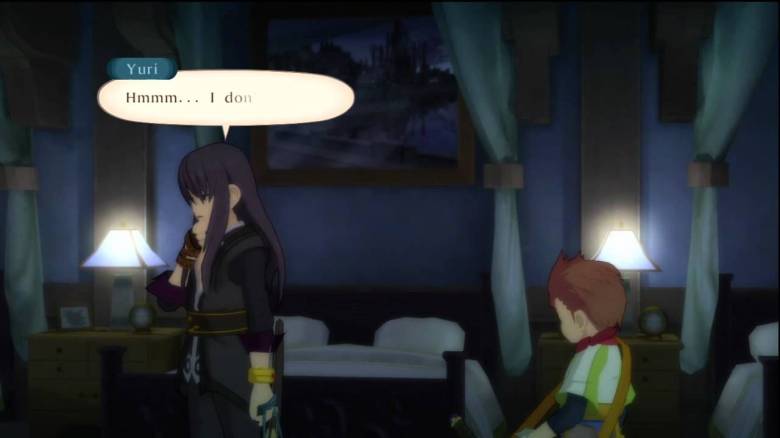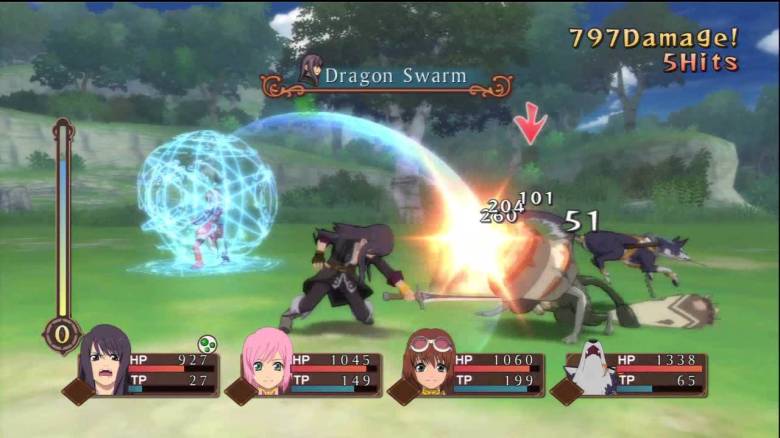
Genre: RPG
Year: 2008
Developed by: Namco Tales Studio
Published by: Namco Bandai Games
Platforms: XBOX 360, PS3, PS4, Switch, PC, XBOX One
#134
Feeling Like: I fought the law
In May of 2015, I wrote an entry of my bi-weekly blog “Serotonin” for the defunct Snackbar-Games. I think it still holds water as to why it was my favorite Tales game, up until Tales of Arise. I could go over the mechanics of what the action RPG entails, or the great party members like Repede, the pipe smoking dog. But that’s not really why Tales of Vesperia lands on spot number 134. I loved how vibrant the world was, and the classic Tales skits, but it was really the character of Yuri and a few scenes in particular that stood out.

Tales of Vesperia is largely agreed upon as one of the best of the Tales series, and certainly a worthy contender for one of the best traditional RPGs of last generation. The soundtrack is unique, hard-hitting and emits an atmosphere that truly thrives. The battle system is lightning-quick and encourages tactics other than button mashing and grinding. I don’t remember full details of the story, but there are two scenes that really stood out for me and propelled Yuri into one of the best protagonists I’ve controlled, and not because of his shining personality or his yearning to protect his friends.
After defeating a notoriously evil enemy, Yuri has found out a collaborator with said enemy is going to get off lightly because of his position on a governmental council. Ragou is truly a nasty example of corruption; he won’t have to answer for his crimes, which include imposing punishing levels of tax, kidnapping and murdering citizens and feeding the dead bodies to monsters, or selling them for profit. Here we see Yuri’s strong sense of justice, right or wrong, prevail. He disguises himself, murders Ragou with his sword and dumps him into the river in the middle of the night. The dialogue isn’t Oscar worthy, but the scene’s impact is undeniably powerful for many reasons.

Primarily, this isn’t predictable behavior for a “good guy.” At the time, I guessed we would live to fight another day and take out Ragou in a more noble and acceptable battle. But Yuri, being the wise old age of 21 (seriously, that’s ancient for a Japanese RPG cast member), has seen things. He’s a former soldier who lives among the poor. He’s sick and tired of seeing how they’re treated, constantly belittled by the upper class, and physically can’t stand to see another example of injustice. His experience in life has led him to make this terrible decision… but is it so terrible?
Another brilliant move was to let Yuri live with his decision without getting caught. Oh sure, people might have suspected he did it, or allude to the fact that it’s quite a coincidence Ragou ended up dead while Yuri was around. But as far as I can remember, he never answers for his crime. There’s no trial, no arrest and no shameful finger wagging by his fellow party members. Ragou is dead, and it’s time to move onto the next adventure. What? He deserved to die. Tell me the world isn’t a better place without him gone.
I found myself fascinated by this scene and its implications. A protagonist with a shade of gray? Somebody who will do wrong to do right? Unbelievable. Yes! This is what I wanted! With the insane range of powers these fictional characters possess and conflicts arising all the time, why shouldn’t the final blow be delivered on a dark bridge under questionable circumstances? Why can’t the villain die unless they’ve transformed into a demon and been given a fair fight? I can’t identify with the notion of murder, but I’ve certainly read about people in positions of power who abused it and wished harsh, swift justice upon them. Who hasn’t?

Yuri, now labelled as a vigilante, strikes again. This kill is far more brutal, and effective; Cumore begs for his life as Yuri edges him off into a sand pit to drown under a dune. Yuri watches and doesn’t move a muscle. Cumore is another disgusting example of humanity who has forced people to work in slave labor camps and sent innocent people to their deaths on a fruitless mission to the middle of the desert. A whimpering coward to the end, he pleads with Yuri. “P-please no! Not like this! I-I don’t want to go like this!” Yuri is having none of it. “Tell me,” he says. “How many times have you heard those very words?” As the shrieks turn to gargles, Cumore is soon gone forever. Our protagonist simply stares and watches, silently confirming to us the deed is done.
It’s quickly revealed that forces of good gain control of the nearby town and the citizens’ lives will be spared going forward. Was Cumore’s death necessary? It’s almost irrelevant; to Yuri, it was unquestionably necessary. He’s probably seen a dozen Cumores escape only to do harm again. And now that he’s done it once, he probably doesn’t think twice about doing it again.

Sadly, the game doesn’t focus much more on this storyline. There are twists and turns and a satisfying ending, but I would have loved for the game to be more about Yuri’s dark side. What would all his friends say if they discovered the gruesome details of how Yuri took the law into his own hands? Would he be able to justify his actions? How would he argue his case? Would he serve any time for his crimes? Would there be a dramatic courtroom scene, like in Chrono Trigger? I can hardly call it wasted potential, since I enjoyed the game to no end. But I’m certainly keen to see this kind of route traveled again.
I suppose the vigilante angle doesn’t have to come from somebody with a bit more experience under their belt. Notions of honor, justice or anger are not exclusive to the more mature crowd. City of God is a tremendous example of what youth, anger and power can result in. But, I’m no longer a kid. I’m not a teenager, unaware of who I am. I’m older. I know who I am. I’m still uncertain about the world, and what to think of it, but I’d like to experiment with those feelings while I swashbuckle through an adventure with somebody closer to my own age and experience. Give me Tales of Vesperia 2 and a focus on Yuri’s darker actions, and I am absolutely there.
I was probably asking for too much, players don’t flock to the Tales series for deep character studies or morally gray scenarios. But Tales of Arise did show that darker, more serious subjects can still be explored by anime people with magical powers and peerless fighting prowess to great effect.
This is the last Tales entry on the 500, but if Arise and Vesperia are any indication, I will pick up and try any future iteration with great anticipation.